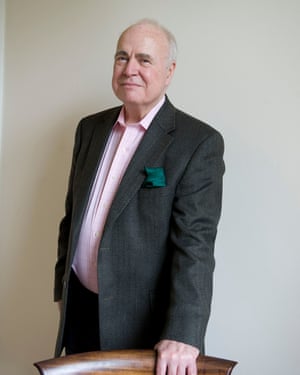{UAH} Hugh McIlvanney invented new ways of describing sport’s beauty, power and fun
Hugh McIlvanney invented new ways of describing sport's beauty, power and fun
Johan Cruyff once said something very wise about the way the best footballers show a part of themselves on the pitch, revealing their character in outline through the way they apply their craft. The same principle applies in every form of work where human beings immerse themselves in what they do, not least in the simple business of writing.
So it was with Hugh McIlvanney, who died on Thursday aged 84, who remains the most distinct, widely cherished sportswriter Britain has produced and whose work was always marked by such a powerful sense of character, place and a vivid internal life.
As a reader it was this quality that stood out. McIlvanney rarely if ever wrote about himself. But you felt you knew him all the same, maintaining a quiet intimacy with that sandpapery wit and warm, challenging presence, expressed through a language of sportswriting McIlvanney himself helped to coin.
I knew him only to say hello to in a press box, or at some industry do – always a little awestruck but secretly relishing the sound of that voice (McIlvanney was one of the great sporting voices in every sense of the world). You always wanted him to talk a little more.
Failing that, there was always that eloquently amused arch of the eyebrows. And McIlvanney was funny in the best way, funny out of affection as much as anything else. Reading some old bits in various books after hearing news of his death, the first passage I came across was about the great Celtic winger Jimmy Johnstone and his awe of his manager, Jock Stein.
McIlvanney writes: "'Y'know he's got spies everywhere,'" that marvellous little eccentric once told me, staring into my face with his eyes as large as dish aerials. 'He's even got spies in the noggin.' For a moment I thought Jimmy was suggesting some infiltration of his mind, a touch of the Manchurian Candidates. Then I latched onto the fact that The Noggin was a pub."
It would be more fun just to reproduce here the whole page of McIlvanney on Johnstone on Stein, but space precludes it. Safe to say Stein didn't have spies in The Noggin, or the noggin. But he did have a friend who lived across the road and watched the door.
Stein would ring the bar and ask in a quiet voice for Mr Johnstone. "When Jimmy reached, unsuspecting, for the receiver he would be blasted several feet by an explosion of the old familiar vituperation." And yes, McIlvanney does get to use "vituperation" here, and it's perfect and apt and a punch to the funny bone when he's sketched the scene so fondly and so effortlessly.
In many ways McIlvanney's legacy will be defined by the association with the great Scottish football managers – Busby, Stein, Shankly – that he explored and illuminated in his work. No doubt many will look back now on YouTube at the wonderfully narrated documentary The Football Men, a study of those old Lanarkshire greats that communicates above all a love of people and place, the cities and surfaces from which they emerged.
Hugh McIlvanney, 1934-2019. Photograph: Francesco Guidicini/Sunday Times/PAAt the start of the first episode there is an interlude where the film takes you out to one of the mines and you hear the clank and the rattle and scrape of the machinery, and then you hear the McIlvanney voice, which seems to emerge out of the same cacophony.
McIlvanney was the son of a miner himself. Born in Kilmarnock in 1934, he began work as a reporter on the Kilmarnock Standard, then the Scottish Daily Express and The Scotsman, before starting a 30-year stint at the Observer in 1963, interrupted by a brief spell at the Daily Express. He moved on to The Sunday Times where he continued to write a column until his retirement in 2016, remaining right until the end warm and effortlessly astringent.
Sports journalism can at times be terribly schmaltzy and self-important, regarding itself with an undeserved sense of tearful reverence (never have so many lifetime gongs been doled out to so many, at so many sombre, dicky bow gala dinners). But in McIlvanney's case the sense of scale and influence is deserved. McIlvanney got there first, was the Beatles and the Stones of his form, inventing just by being himself a new way of describing the power, the beauty and the basic fun of this shared public spectacle.
There was also a breadth in how he did this. It was part of McIlvanney's talent that he broke through the pointless but very British divide between tabloid and broadsheet styles. The idea is still out there now that to be writerly, to attempt to describe as well as report, is a kind of vice, a pretension to be left only to "the chin-strokers".
As Brian Glanville wrote in his book Football Memories: "When Hugh went to the Daily Express they hadn't the wit to see he was the perfect person to put an end to the ludicrous dichotomy between 'posh' and popular writing, which exists in the realm of sports writing only in this country."
McIlvanney did this better than anyone. But he did it also without ceremony, his skill to drip a spark of insight and descriptive prose into anything from a few short pars to the two-thousand-word full gauge.
In the process he communicated that feeling of sport as something precious, both a glorious irrelevance and a mirror of so many interesting human qualities; all of this enriched by his own ability to report it with such art and such fraternal, inclusive warmth.
Disclaimer:Everyone posting to this Forum bears the sole responsibility for any legal consequences of his or her postings, and hence statements and facts must be presented responsibly. Your continued membership signifies that you agree to this disclaimer and pledge to abide by our Rules and Guidelines.To unsubscribe from this group, send email to: ugandans-at-heart+unsubscribe@googlegroups.com













0 comments:
Post a Comment